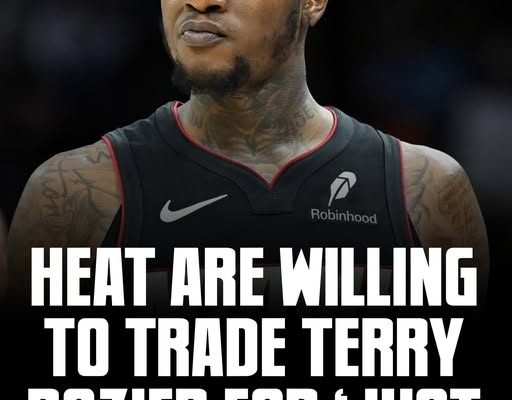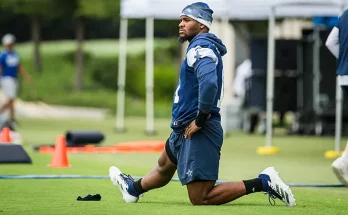The Miami Heat have long been known for their culture, discipline, and a relentless pursuit of winning. From the Pat Riley era that has spanned decades, to the leadership of Erik Spoelstra on the sidelines, the franchise has built its reputation on accountability, toughness, and an unwavering commitment to staying competitive in the NBA landscape. But in recent weeks, whispers have emerged about the team’s stance on veteran guard Terry Rozier, suggesting that Miami may be willing to move him for “just about anything.” Such phrasing carries weight, because it signals not just that Rozier is available, but that the organization may no longer see him as a valuable piece in their future plans. The implications of this rumor ripple out in many directions: what it means for Rozier’s standing in the league, what it says about Miami’s roster-building strategy, and how it fits into the broader context of the Heat’s pursuit of another championship window.
Terry Rozier was once viewed as a spark plug guard who brought energy, shot-making, and swagger to whichever roster he joined. His breakout came during his Boston Celtics tenure when, filling in for injured stars, he spearheaded playoff runs and earned the nickname “Scary Terry” for his fearless play. After moving to the Charlotte Hornets, Rozier blossomed into a high-usage scorer, a player capable of creating his own shot, hitting contested threes, and acting as a steadying offensive presence for a young and developing squad. His time in Charlotte established him as a legitimate 18-to-20 points per game scorer, though questions always lingered about whether his scoring-heavy style translated to winning basketball at the highest levels. Miami’s gamble in acquiring Rozier was built on the idea that his shot creation and perimeter firepower could relieve pressure from Jimmy Butler and Tyler Herro, especially in the halfcourt offense where the Heat often struggled in postseason play.
Theoretically, Rozier’s skills were supposed to complement Miami’s two-way ethos. But reality has been mixed. Injuries, inconsistency, and fit issues have kept Rozier from making the expected impact. In a Heat system that demands defensive buy-in, precision, and a willingness to sacrifice for team concepts, Rozier has struggled to consistently meet those benchmarks. While he can score in bunches, his efficiency has wavered, and at times he has looked more like a player forcing offense rather than organically fitting into Miami’s schemes. For a team that thrives on role clarity, such misalignment stands out even more. Reports that the Heat would trade Rozier for “just about anything” therefore do not emerge in a vacuum, but as a logical next step in assessing how to maximize the roster around Butler, Bam Adebayo, and Herro.
The wording of “just about anything” is perhaps the most jarring element of the rumor. NBA front offices are typically calculated and measured in how they discuss players, especially veterans who carry name recognition and a track record of production. To say a player is available is one thing; to suggest he can be moved for virtually anything of value suggests a desire not only to move off his salary but also to free up a roster spot or change the dynamic of the team. Miami is known for being ruthless when it comes to difficult decisions—no player, outside of its true superstars, is ever truly safe. This organizational mindset has kept them nimble, opportunistic, and consistently competitive despite not always having lottery picks or cap flexibility. In Rozier’s case, being shopped for almost any return is a reflection of Miami’s cold but efficient approach to personnel management.
From a financial standpoint, Rozier’s contract plays a major role in this calculus. He signed a sizable deal in Charlotte before being traded, and that number has not always matched his production since joining Miami. For a team that is often flirting with the luxury tax and must manage its books carefully while still trying to compete, every contract slot matters. If Miami views Rozier’s deal as a burden that limits flexibility in future trades or roster moves, then moving him, even for marginal assets, could be seen as addition by subtraction. Shedding his salary could give Miami room to explore bigger opportunities, whether that be chasing disgruntled stars, strengthening depth at other positions, or positioning themselves better for future free agent markets.
Another angle to consider is Miami’s identity as a defensive juggernaut. Under Spoelstra, the Heat have relied on tough, switchable defenders who can execute complicated schemes and thrive in high-pressure environments. Rozier, while not a poor defender in all contexts, does not bring the size or defensive versatility that Miami typically values in its guards. When he is not scoring efficiently, his limitations on the other end become more glaring. Miami might prefer to reallocate his minutes to players who embody the Heat’s defensive mindset, or to guards who can balance facilitating duties without dominating possessions in the same way Rozier tends to do.
From Rozier’s perspective, being labeled as tradeable for “just about anything” is a tough pill to swallow. Professional athletes understand that the business side of sports is brutal, but such phrasing can feel like a dismissal of their contributions and talent. That said, Rozier’s career arc suggests that he thrives in situations where he is empowered as a primary or secondary scoring option, rather than being asked to adjust within an already-established pecking order. On a younger or rebuilding team, his scoring punch and veteran experience could be more appreciated. Franchises in need of backcourt offense—teams struggling with shot creation or guard depth—may see Rozier as a valuable short-term solution, even if Miami no longer does.
The question then becomes: what kind of market exists for Rozier? Teams around the league are always evaluating mid-tier guards, and Rozier’s ability to score in isolation and knock down threes has value in the right context. However, his contract complicates things, as many contending teams may hesitate to take on his salary unless they believe he can play a meaningful playoff role. Rebuilding teams might prefer to use their cap space on younger prospects or draft assets rather than a veteran guard in his late twenties. Still, there are franchises on the fringes of contention who could see Rozier as a bench scorer or a spark plug sixth man, someone who changes the tempo of games with instant offense. The key will be whether Miami can find a partner who views Rozier as more than just a contract to absorb.
For the Heat, moving Rozier could also signal a larger strategy at play. Jimmy Butler is not getting younger, and his prime years are finite. Every roster move Miami makes in this window must be geared toward maximizing Butler’s chances of delivering another Finals run. If Rozier is not viewed as a piece that helps achieve that, then shifting him out is not just logical, but necessary. Pat Riley and his front office are known to be star-hunters, always lurking whenever a big name becomes available. Clearing Rozier’s salary and roster spot could be a prelude to positioning themselves for a bigger splash, whether that comes this season or in the near future. In that sense, moving Rozier for “just about anything” is less about what comes back in return and more about creating the flexibility to chase something larger.
Critics might argue that Miami gave up too soon on Rozier, that his integration into the Heat culture needed more time, and that his skill set still has untapped value in the right system. Basketball history is filled with examples of players who initially struggled in one context but thrived once adjustments were made. Yet Miami has never been an organization to linger in indecision. If a player does not fit, they are moved. This decisiveness has been both a strength and a cold reality of the Heat way. Rozier, for all his talent, seems to be the latest example of a player who is not fully aligned with what Miami requires.
The broader lesson here is about organizational identity and fit. Rozier is a talented player, but not every talent aligns with every team’s goals. Miami’s willingness to part ways so quickly is not necessarily an indictment of Rozier’s abilities, but rather a reflection of the Heat’s narrow focus on the type of roster that can contend for championships in the immediate term. In another setting, Rozier might thrive again, recapturing the “Scary Terry” persona that electrified Boston fans years ago. For Miami, however, the experiment appears close to its end.
As this story develops, the NBA will watch closely. Trades are not just about player movement—they are about signals. When the Miami Heat, an organization so disciplined and calculated, openly communicate that they are willing to move a player for almost anything, it sends a message to the league about their intent. They are not content with being stagnant. They are looking to pivot, to adjust, and to reshape their roster for the battles ahead. And in that pursuit, sentimentality takes a back seat.
In the end, Terry Rozier’s time with the Miami Heat might be remembered as a short chapter that simply did not fit the larger narrative. The Heat are in constant search of the right pieces to complement Butler and Adebayo, and Rozier, despite his scoring ability, may not be part of the solution. His departure, should it come soon, will serve as another reminder of how quickly fortunes can change in the NBA, and how a player’s value is always tied to context. For Miami, the decision underscores their relentless pursuit of winning at all costs. For Rozier, it could be the beginning of a new opportunity, perhaps with a team that values him not as a contract to move, but as a weapon to unleash. Either way, the phrase “just about anything” speaks volumes, and its echoes will shape both Rozier’s future and Miami’s next move in their ever-evolving quest for glory.



